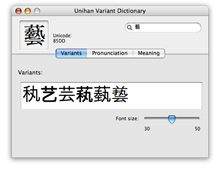最近根據友人 Joseph Wicentowski 的需求和意見,寫了一個叫做 Unihan Variant Dictionary 的小軟體。它其實就是個異體字字典,使用者可以輸入一個漢字來查到其他收錄於 Unicode 中的變體,但除此之外也能查詢到字義以及在各種東亞語言(包括中、粵、日、韓、越)中的發音。其實在 Mac OS X 內建的字元面板中也提供了類似的異體字查詢功能,不過 Unihan Variant Dictionary 在速度及方便性上有一些優勢,而且它支援系統的「服務」功能,因此使用者在使用其他應用程式時也可立即呼叫並查詢。目前它適用於 Mac OS X 10.2 以上。
 這個軟體使用的異體字資料庫是來自 Unicode 組織所維護的 Unihan Database。Unihan 資料庫針對每個漢字收錄了許多資訊,除了異體、字音、字義之外,還有各種系統的文字編碼、倉頡碼、筆畫數、使用頻率、在各種字典中出現的位置、甚至在韻書和語言學著作中的位置等資料。當然在軟體中只納入了與形、音、義有關的資料。不過在編寫軟體的過程中我們了解到 Unihan 的異體字資料其實有許多不足之處,因此我們也加入了日本京都大學安岡孝一先生的異體字表。我們也發現 Mac OS X 的字元面板所提供的「相關字元」其實包含了相當豐富的資料,如果未來能再結合這其中的資料,應該可以提供最詳盡的查詢結果。此外 Joe 發現 Unihan 所用的韓語拼音似乎並非韓國常用的系統,因此在實用性上也許會打點折扣。
這個軟體使用的異體字資料庫是來自 Unicode 組織所維護的 Unihan Database。Unihan 資料庫針對每個漢字收錄了許多資訊,除了異體、字音、字義之外,還有各種系統的文字編碼、倉頡碼、筆畫數、使用頻率、在各種字典中出現的位置、甚至在韻書和語言學著作中的位置等資料。當然在軟體中只納入了與形、音、義有關的資料。不過在編寫軟體的過程中我們了解到 Unihan 的異體字資料其實有許多不足之處,因此我們也加入了日本京都大學安岡孝一先生的異體字表。我們也發現 Mac OS X 的字元面板所提供的「相關字元」其實包含了相當豐富的資料,如果未來能再結合這其中的資料,應該可以提供最詳盡的查詢結果。此外 Joe 發現 Unihan 所用的韓語拼音似乎並非韓國常用的系統,因此在實用性上也許會打點折扣。
這樣的軟體對於學習東亞語言的外國人以及對漢字變異有興趣者應該是有相當用處的。若您有其他的需求或建議也請不吝讓我們知道。





Antonius, the bible may be good for a lot of things, but it's certainly not the best choice for learning a new language. Of course "it's hard to understand" and it won't help at all to order fried shrimp in a Chinese restaurant. Or to ask for an exchange booth at the airport. Or with any real-life problem you're likely to encounter. Start with a beginners course like Pimsleur's or VocabuLearn or Living Language and practice with some of the study tools 阿傑 pointed out below.
Better yet, get a qualified teacher - not a priest, unless he's qualified for teaching languages - for example by taking a class at your community college.